
Nehemiah Curtis "Skip" James was an American Delta blues singer, guitarist, pianist and songwriter. AllMusic stated: "This emotional, lyrical performer was a talented blues guitarist and arranger with an impressive body of work."

Joseph Lee "Big Joe" Williams was an American Delta blues guitarist, singer and songwriter, notable for the distinctive sound of his nine-string guitar. Performing over five decades, he recorded the songs "Baby, Please Don't Go", "Crawlin' King Snake" and "Peach Orchard Mama", among many others, for various record labels, including Bluebird, Delmark, Okeh, Prestige and Vocalion. He was inducted into the Blues Hall of Fame on October 4, 1992.
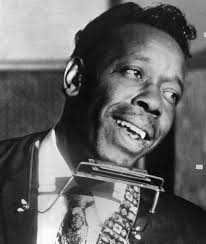
Slim Harpo was an American blues musician, a leading exponent of the swamp blues style, and "one of the most commercially successful blues artists of his day". He played guitar and was a master of the blues harmonica, known in blues circles as a "harp". His most successful and influential recordings included "I'm a King Bee" (1957), "Rainin' in My Heart" (1961), and "Baby Scratch My Back" (1966), which reached number one on Billboard's R&B chart and number 16 on its broader Hot 100 singles chart.

David "Honeyboy" Edwards was a Delta blues guitarist and singer from Mississippi.
James "Kokomo" Arnold was an American blues musician. A left-handed slide guitarist, his intense style of playing and rapid-fire vocal delivery set him apart from his contemporaries. He got his nickname in 1934 after releasing "Old Original Kokomo Blues" for Decca Records, a cover version of Scrapper Blackwell's blues song about the city of Kokomo, Indiana.
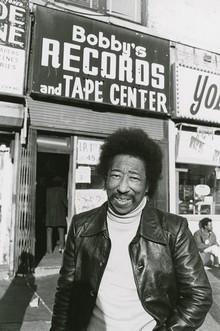
Bobby Robinson was an American independent record producer and songwriter in New York City, most active from the 1950s through the mid-1980s.
Admirl Amos Easton, better known by the stage name Bumble Bee Slim, was an American Piedmont blues singer and guitarist.

"Come On in My Kitchen" is a blues song by Robert Johnson. Music writer Elijah Wald has described it as "a hypnotic lament" and "his first unquestionable masterpiece". A sometime traveling companion and fellow musician, Johnny Shines, recalled that Johnson's performance of the song could be overpowering:
One time in St. Louis we were playing one of the songs that Robert would like to play with someone once in a great while, "Come On In My Kitchen". He was playing very slow and passionately, and when we had quit, I noticed no one was saying anything. Then I realised they were crying – both women and men.
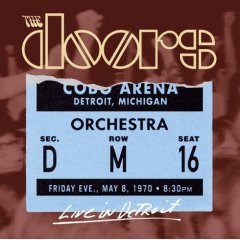
Live in Detroit is a double CD live album by the American rock band the Doors. It was recorded at the Cobo Arena in Detroit on May 8, 1970 during the band's 1970 Roadhouse Blues Tour. It was released on October 23, 2000 on Rhino Records.
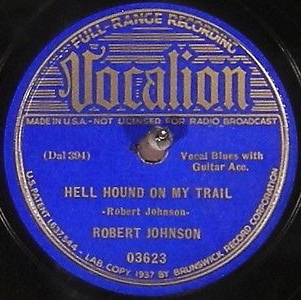
"Hellhound on My Trail" is a blues song recorded by Mississippi Delta bluesman Robert Johnson in 1937. It was inspired by earlier blues songs and blues historian Ted Gioia describes it as one of Johnson's "best known and most admired performances—many would say it is his greatest".
"Walkin' Blues" or "Walking Blues" is a blues standard written and recorded by American Delta blues musician Son House in 1930. Although unissued at the time, it was part of House's repertoire and other musicians, including Robert Johnson and Muddy Waters, adapted the song and recorded their own versions.

Clarence Sims, best known by his stage name, Fillmore Slim, is an American blues vocalist and guitarist with five albums to his credit. During the 1960s and 1970s, he was also a known pimp in San Francisco, referred to several times as "The West Coast Godfather of the Game" and "The Pope of Pimping".

Rollin' Stone: The Golden Anniversary Collection is a compilation album collecting the first 50 master recordings of blues singer Muddy Waters for Chess Records. The collection spans Muddy's debut with then named Aristocrat Records circa 1947, and traces his evolution as a songwriter and musician up to September 17, 1952 on what became Chess Records after the company changed ownership. It is the first in a series of releases chronicling Muddy Waters' complete recording career at Chess. The second release in the series is Hoochie Coochie Man: The Complete Chess Masters, Volume 2, 1952–1958 (2004) and the third release in the series is You Shook Me: The Complete Chess Masters, Volume 3, 1958 to 1963 (2012).
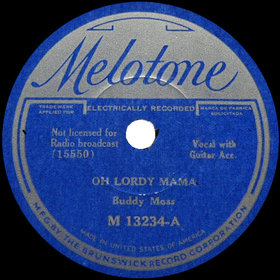
"Hey Lawdy Mama" is a Piedmont blues song recorded by Buddy Moss in 1934. The song became popular among jazz musicians with early recordings by Count Basie and Louis Armstrong. In 1943, a version recorded by Andy Kirk and His Twelve Clouds of Joy, with vocals by June Richmond, was a hit, reaching number four on the Billboard R&B chart.
"Milk Cow Blues" is a blues song written and originally recorded by Kokomo Arnold in September 1934. In 1935 and 1936, he recorded four sequels designated "Milk Cow Blues No. 2" through No. 5. The song made Arnold a star, and was widely adapted by artists in the blues, Western swing and rock idioms.
Sam Carr was an American blues drummer best known as a member of the Jelly Roll Kings.

Frank Fotusky is an American singer-songwriter based in Portland, Maine. He plays six- and twelve-string acoustic guitar, and regularly performs in the Greater Portland area.
Edward Taylor, better known as Eddie Taylor Jr., was an American Chicago blues and electric blues guitarist, singer and songwriter. He released six studio albums, and a compilation album of his better known tracks, all on the European-based label, Wolf Records. Among the musicians who worked in Taylor's backing band was his fellow guitar player Johnny B. Moore. Taylor also supported other musicians including Moore, Little Arthur Duncan, Willie Kent and Hubert Sumlin, plus Buddy Guy, Keith Richards, Eric Clapton, and Billy Gibbons.

Bob Miller was an American songwriter, recording artist, A&R representative, and publisher.













